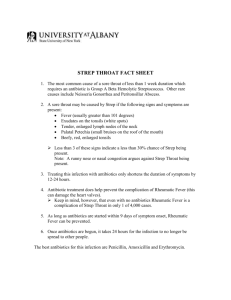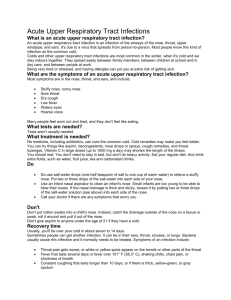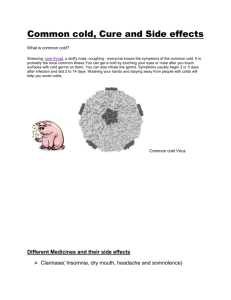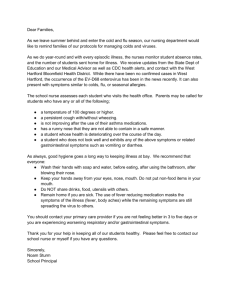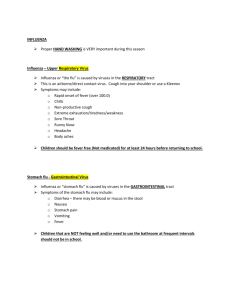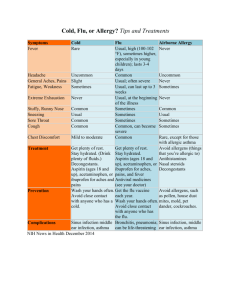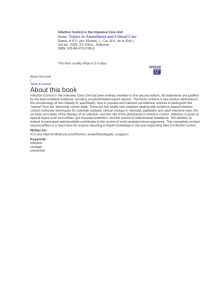Videos
advertisement
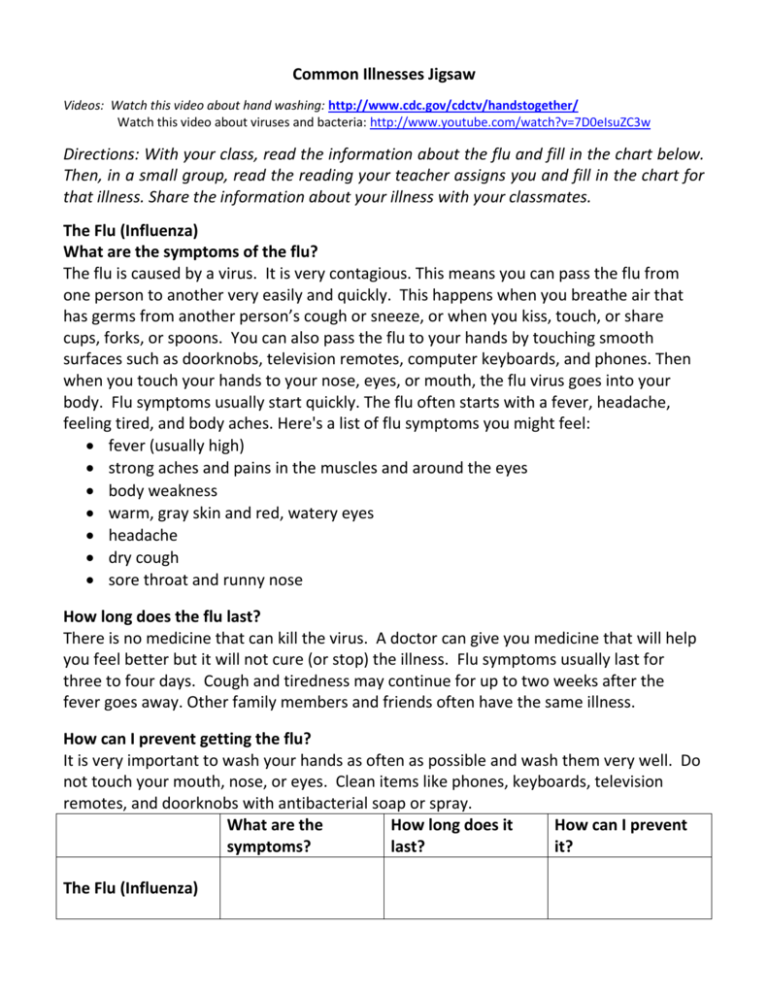
Common Illnesses Jigsaw Videos: Watch this video about hand washing: http://www.cdc.gov/cdctv/handstogether/ Watch this video about viruses and bacteria: http://www.youtube.com/watch?v=7D0eIsuZC3w Directions: With your class, read the information about the flu and fill in the chart below. Then, in a small group, read the reading your teacher assigns you and fill in the chart for that illness. Share the information about your illness with your classmates. The Flu (Influenza) What are the symptoms of the flu? The flu is caused by a virus. It is very contagious. This means you can pass the flu from one person to another very easily and quickly. This happens when you breathe air that has germs from another person’s cough or sneeze, or when you kiss, touch, or share cups, forks, or spoons. You can also pass the flu to your hands by touching smooth surfaces such as doorknobs, television remotes, computer keyboards, and phones. Then when you touch your hands to your nose, eyes, or mouth, the flu virus goes into your body. Flu symptoms usually start quickly. The flu often starts with a fever, headache, feeling tired, and body aches. Here's a list of flu symptoms you might feel: fever (usually high) strong aches and pains in the muscles and around the eyes body weakness warm, gray skin and red, watery eyes headache dry cough sore throat and runny nose How long does the flu last? There is no medicine that can kill the virus. A doctor can give you medicine that will help you feel better but it will not cure (or stop) the illness. Flu symptoms usually last for three to four days. Cough and tiredness may continue for up to two weeks after the fever goes away. Other family members and friends often have the same illness. How can I prevent getting the flu? It is very important to wash your hands as often as possible and wash them very well. Do not touch your mouth, nose, or eyes. Clean items like phones, keyboards, television remotes, and doorknobs with antibacterial soap or spray. What are the How long does it How can I prevent symptoms? last? it? The Flu (Influenza) 1. The Common Cold What are the symptoms of the common cold? The common cold is caused by a virus. With the common cold, you may have cold symptoms such as an itching or sore throat, sneezing, watery eyes, and stuffed or runny nose. Stronger symptoms like a high fever or muscle aches usually mean you have the flu and not a cold. How long does a cold last? There is no medicine that can kill the virus. You can take medicine that will help you feel better but it will not cure (or stop) the illness. Cold symptoms can last for days or even weeks. How can I prevent getting the common cold? Wash your hands as often as possible and wash them very well. Do not touch your mouth, nose, or eyes. Clean items like phones, keyboards, television remotes, and doorknobs with antibacterial soap or spray. What are the symptoms? 1. The Common Cold 2. The Stomach Flu (Gastroenteritis) 3. Ear Infection 4. Sinus Infection 5. Strep Throat How long does it last? How can I prevent it? 2. The Stomach Flu (Gastroenteritis) What are the symptoms of the stomach flu? The stomach flu is really called gastroenteritis. It is when there is a problem with the stomach and intestines. Gastroenteritis may be caused by a virus, bacteria, or parasites in spoiled food or unclean water. Symptoms of gastroenteritis or stomach flu include: Abdominal cramps Stomach pain Nausea Vomiting Diarrhea Dehydration, when your body does not have enough water, can happen if you do not drink enough when you have the stomach flu. Make sure you drink many liquids (fluids). How long does the stomach flu last? The stomach flu usually lasts about a day or two. Doctors say you should begin to eat regular foods after 24 hours. How can I prevent getting the stomach flu? Wash your hands as often as possible and wash them very well. Do not touch your mouth, nose, or eyes. Clean items like phones, keyboards, television remotes, and doorknobs with antibacterial soap or spray. What are the symptoms? 1. The Common Cold 2. The Stomach Flu (Gastroenteritis) 3. Ear Infection 4. Sinus Infection 5. Strep Throat How long does it last? How can I prevent it? 3. Ear Infection What are the symptoms of an ear infection? Middle ear infections are usually caused by bacteria, but sometimes they are caused by viruses. Symptoms of a middle ear infection start 2 to 7 days after the start of a cold. During a cold, sinus or throat infection, the tubes in the ears are blocked and the fluid (liquid) in the ear cannot pass to the throat. When this happens, bacteria or viruses start to grow and cause an ear infection. Symptoms of an ear infection may include: Ear pain. Babies often pull at their ears when they have an earache. Fever. Liquid coming from the ear that is thick and yellow or bloody. Not hungry, vomiting, and grumpy behavior. Trouble sleeping. Trouble hearing. How long does an ear infection last? If the ear infection is from bacteria, the Doctor can prescribe antibiotics and the ear infection will usually go away quickly. If the ear infection is from a virus, the doctor can give you medicine to help you feel better but it will take more time for the infection to go away. How can I prevent getting an ear infection? Wash your hands as often as possible and wash them very well. Do not touch your mouth, nose, or eyes. Clean items like phones, keyboards, television remotes, and doorknobs with antibacterial soap or spray. Ear infections start with a cold, sinus, or throat infection. If you can prevent yourself from getting one of these illnesses, you can prevent an ear infection. What are the symptoms? 1. The Common Cold 2. The Stomach Flu (Gastroenteritis) 3. Ear Infection 4. Sinus Infection 5. Strep Throat How long does it last? How can I prevent it? 4. Sinus Infection What are the symptoms of a sinus infection? A sinus infection usually starts with a cold. The sinuses, located between your eyes and under your brow, fill with mucus (thick liquid) and do not drain. Bacteria or viruses begin to grow in the mucus and cause an infection. If a stuffy nose lasts for more than 8 to 10 days, you probably have a sinus infection. Pain in the face, usually between the eyes and above the nose, and a stuffy or runny nose are the main symptoms of sinusitis. You also may have a yellow or green mucus (thick liquid) coming from your nose. Other common symptoms include: Headache. Bad breath. Stuffy nose. Cough that produces mucus. Fever. Tooth pain. Difficulty tasting or smelling. How long does a sinus infection last? A sinus infection caused by a virus usually lasts for 4 weeks or less and goes away without medicine. A sinus infection caused by bacteria usually requires antibiotics and should go away within a day or two. How can I prevent getting a sinus infection? Wash your hands as often as possible and wash them very well. Do not touch your mouth, nose, or eyes. Clean items like phones, keyboards, television remotes, and doorknobs with antibacterial soap or spray. Sinus infections usually start with a cold, so if you can prevent yourself from getting a cold, you can prevent a sinus infection. What are the symptoms? 1. The Common Cold 2. The Stomach Flu (Gastroenteritis) 3. Ear Infection 4. Sinus Infection 5. Strep Throat How long does it last? How can I prevent it? 5. Strep Throat What are the symptoms of strep throat? Strep throat is caused by bacteria and it is very contagious. That means it can easily be passed from person to person. When a person who has strep throat breathes, coughs, or sneezes, tiny droplets with the strep bacteria go into the air. These droplets can be breathed in by other people. If you come into contact with strep, it will take 2 to 5 days before you start to have symptoms. The most common symptoms of strep throat are: A sudden, painful sore throat. Pain when you swallow. Fever over 101°F (38.3°C). Swollen tonsils and lymph nodes. White or yellow spots on the back of a bright red throat. Headache and belly pain are possible. Coughing, sneezing, and a runny or stuffy nose are NOT symptoms of strep throat. If you have a sore throat with these symptoms, you probably have a cold, not strep throat. How long does strep throat last? Doctors treat strep throat with antibiotics. Most people’s symptoms go away 24 hours after they start antibiotics. If you don't take antibiotics, symptoms may continue for weeks and the bacteria could move to other parts of the body. How do you prevent strep throat? If possible, do not have contact with anyone who has strep throat. If you have strep throat, do not make contact with others until 24 hours after your fever is gone. Wash your hands as often as possible and wash them very well. Do not touch your mouth, nose, or eyes. Clean items like phones, keyboards, television remotes, and doorknobs with antibacterial soap or spray. What are the symptoms? 1. The Common Cold 2. The Stomach Flu (Gastroenteritis) 3. Ear Infection 4. Sinus Infection 5. Strep Throat How long does it last? How can I prevent it? Answers: The Flu (Influenza) 1. The Common Cold 2. The Stomach Flu (Gastroenteritis) 3. Ear Infection 4. Sinus Infection 5. Strep Throat What are the symptoms? High fever headache What are the symptoms? Sneezing, runny nose, watery eyes How long does it last? 1 or 2 days How can I prevent it? Wash hands, clean items, don’t touch mouth, nose, eyes How long does it How can I prevent last? it? For days even weeks Wash hands, clean items, don’t touch mouth, nose, eyes Stomach pain 3 or 4 days Wash hands, clean Vomiting, diarrhea items, don’t touch mouth, nose, eyes Ear pain, fever, Goes away quickly Wash hands, clean trouble sleeping with antibiotic items, don’t touch mouth, nose, eyes Headache, fever, Virus: 4 weeks Wash hands, clean stuffy nose Bacteria: 2 to 3 days items, don’t touch after antibiotic mouth, nose, eyes Sore throat, fever, 24 hours after Wash hands, clean white spots in throat antibiotic items, don’t touch mouth, nose, eyes
